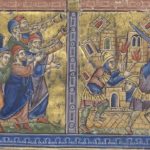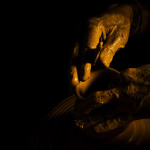We run our website the way we wished the whole internet worked: we provide high quality original content with no ads. We are funded solely by your direct support. Please consider supporting this project.

What Type of Faith Do You Have?
Genesis 32 tells the story of Jacob, wrestling through the night with a nameless man, revealed to be none other than God Himself. We read that when this man “saw that he could not overpower” Jacob, he “touched the socket of Jacob’s hip so that his hip was wrenched as he wrestled with the man” (v. 25).
It is only at daybreak, after a long night of wrestling, that the Lord entreats Jacob to end his struggle (v. 26). However, Jacob refuses to release his grip until he receives a blessing. The Lord responds by asking, “What is your name?” This request leads to the punch line of the story. Apparently willing to do whatever it takes to receive a “blessing” from his wrestling partner, Jacob gives his name, at which point the Lord immediately informs him that his name is about to change. From now on, the Lord says, Jacob will be called Israel because he has “struggled with God and with human beings and overcome.”
“Jacob” did not become “Israel” because he overpowered the Lord, but because he had the audacity to wrestle with God, holding on until he received the “blessing” for which he fought. This new christening speaks to what I call an Israelite Faith: a faith that calls for the courage to struggle honestly with the Creator, having even the audacity to wrestle in pursuit of blessing.
However, there is more to this name change. The meaning of “Jacob” in popular usage of the time literally means “heel catcher,” for Jacob was born grabbing the heel of his twin brother, Esau (Gen 25:26). It has the connotation of one who connives to supplant another, and the story of Jacob bears this out as he was a true trickster.
The meaning of “Jacob” challenges our ordinary conceptions of faith and how it works. Often, what masquerades as faith is really a form of mental trickery: we artificially convince ourselves, side-step hard questions, and avoid at all cost the courageous wrestling God here applauds. We follow disingenuously, trying to believe the right things, use the right pious language, and act in the right ways in order to get something from God, whether it be salvation or healing or some other blessing.
When we do this, we do not base our faith on an honest and rational evaluation of the merits of what we profess to believe. Rather, we avoid facts and arguments that might shake our faith. In other words, much of what we call faith today is Jacob-like, not Israel-like.
The biblical heroes of the faith are better known for their willingness to be uncomfortable and to wrestle honestly with God. We see this in Genesis 18 with Abraham, who questioned God’s justice. Moses objected to God’s plans to destroy the Israelites in Exodus 32. Jeremiah objected to God’s actions—or at least what he thought were his actions (Jer 12:1; 14:8-9). And Habakkuk expressed his anger and confusion about God’s apparent inconsistency.
Israelite faith is not a faith centered on right beliefs and pious, religious language. And it’s certainly not a faith that focuses on fostering a sense of security at cost to real reflection. Rather, it’s a faith so grounded in authenticity that is unwilling to sweep questions, doubts, and complaints under a pious rug to avoid pain and uncertainty. It’s a faith that is not afraid to go to the mat with God.
—Adapted from Benefit of the Doubt, pages 78-83
Category: General
Tags: Faith, Israel, Jacob
Topics: Faith & Doubt
Related Reading

Part Three of Greg’s Interview with David D. Flowers
Here’s the final interview that Greg did with David D. Flowers in which he discusses his upcoming book Benefit of the Doubt: Dismantling the Idol of Certainty. Check it out! From the interview: Faith in Scripture isn’t about striving for certainty: it’s about being willing to commit to a course of action — to a way…

Gungor and Doubt
Gungor is working through the issue of doubt on their new album. (Thanks Orlando for the heads-up.) We’re busily getting ready for the Faith, Doubt & the Idol of Certainty conference tomorrow. It’s not too late to join us. Hope to see you there.

Reading the Bible “by Faith”
The cruciform approach to reading the Bible—and specifically the culturally-conditioned and sin-stained portraits of God—requires faith on the part of the reader, which I argue in Crucifixion of the Warrior God. On one level we can discern by faith that often times God broke through the limitations and sin of the ancient authors, for we…

God is Flexible: Romans 9, Part 4
As we continue this series on Romans 9, [Here’s the link to the first post in the series.] today we will look at the famous potter/clay analogy. Most tend to interpret the potter and clay image as supporting the deterministic view of God. But in fact, it teaches just the opposite. This is the fifth argument…

What Will You Do With Your Doubt?
Richard Beck shared some of his thoughts on Christianity as something that for many of us is our “native religion”…something we were born into and that is, to quote Wendell Berry, “an intimate belonging of our being; it informs our consciousness, our language, and our dreams.” With Christianity so foundational to our identities, doubt is a…

Faith or Magic?
Many Christians today treat faith like magic. While the content of what Christians believe is obviously different from pagan practitioners of magic, the way they believe and the motive they have for believing, seems to be very similar. Magic is generally understood to involve people engaging in special behaviors that empower them to gain favor…
